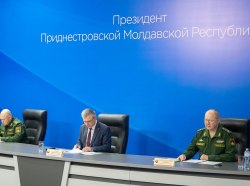Tiraspol, January 13. /Novosti Pridnestrovya/. As a result of the Russia-NATO talks held in Brussels the day before, NATO Secretary-General Jens Stoltenberg said that Russian troops should be withdrawn from Moldova since no one invited them.
By the armed forces of Russia in the Republic of Moldova, the Secretary-General of the North Atlantic Alliance means the Russian peacekeepers in Pridnestrovie. But the Joint Control Commission, the governing body of the peacekeeping operation, recalled that Russian peacekeepers were here under the agreement "On the principles of the peaceful settlement of an armed conflict." It was signed by the presidents of Russia and Moldova in 1992.
Based on international documents, Russian troops can be withdrawn after the Moldovan-Pridnestrovian conflict settlement.
“When the relevant NATO officials try to comment on the situation here, specifically in Pridnestrovie, they are far from the legal framework that has been formed over the years. This is the thirtieth year of the peacekeeping operation, which has proved to be effective. We are well aware that it can ensure peace and security,” Oleg Belyakov, Co-Chairman of the JCC from Pridnestrovie commented.
Recall that in July 1992, Russia stopped the armed aggression of Moldova against Pridnestrovie. Before this, several conciliation commissions, including those with the participation of international representatives, tried to stop the war on the Dniester. However, the mission of observers could not prevent the Republic of Moldova armed formations` attacks on Bendery in June 1992. The bloodshed only stopped with the arrival of Russian peacekeepers.
The peacekeeping operation under the auspices of the Russian Federation has been implemented in Pridnestrovie since 1992 based on interstate agreements. It is recognized as one of the most successful ones in history: since the beginning of its operation, hostilities have not resumed, not a single member of the peacekeeping mission has died. In addition to the Russian Federation, the parties to the conflict take part in it - the PMR and the Republic of Moldova, as well as a group of military observers from Ukraine. The peacekeeping contingent of the Russian Federation is formed from the Operational Group of Russian Forces in Pridnestrovie.
At the same time, Moldova has been trying to withdraw Russian peacekeepers from Pridnestrovie all these years. This, in particular, was repeatedly stated by the current President of the Republic of Moldova, Maya Sandu. Her statements were supported by NATO. Jens Stoltenberg, Secretary-General of the organization, said that Russia allegedly violated the "territorial integrity of Moldova" by deploying peacekeepers in Pridnestrovie.
Russian President Vladimir Putin has repeatedly noted that the withdrawal of peacekeepers is only possible after the settlement of the Moldovan-Pridnestrovian conflict.
Earlier, the PMR President Vadim Krasnoselsky said that any attempts to destroy the existing peace guarantee mechanism could lead to the Moldovan-Pridnestrovian conflict rollback to the situation of the early 90s. Due to the unsettled state-legal relations, Pridnestrovie and Moldova do not have a comprehensive agreement that would exclude the possibility of resuming a direct military confrontation, Vadim Krasnoselsky explained.








